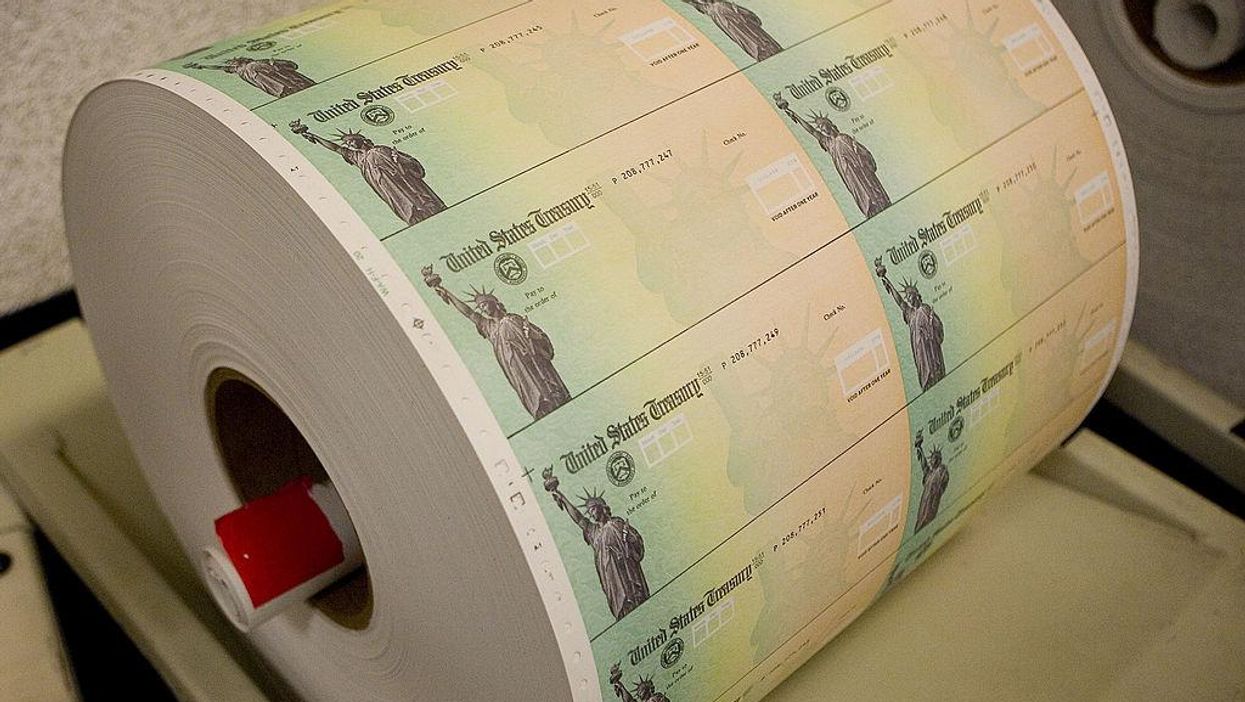
Jeff Fusco/Getty Images

According to federal law enforcement officials, the fraud is deeply complex and will take months to fully account for
Waste, fraud, and abuse of taxpayer money in the coronavirus relief package Congress passed last year have reached "staggering" levels, to an extent not fully known but estimated to be more than $100 billion, according to a report from NBC News.
Last year, while the American people were in the full grip of economic hardship imposed on them by the government's response to the coronavirus pandemic, the United States Congress passed a $2 trillion spending bill to provide economic relief. The Coronavirus Aid, Relief and Economic Security Act, or CARES Act, was intended to give needed aid to 17 million unemployed people, help small businesses survive, and provide stimulus checks for every nearly American.
But liars, cheaters, and scammers have swindled billions of dollars from the U.S. government, stealing money from taxpayers and depriving people in need of the economic relief Congress appropriated for them during the pandemic.
"The Labor Department inspector general has yet to complete a full investigation but, based on previous programs, estimates at least $63 billion of the $630 billion in disbursements has been misspent," NBC News reported Saturday. "The full scope of the loss in taxpayer funds is likely many times higher, experts and officials say, soaring well beyond $100 billion."
In California, one fraud scheme disrupted by police cost taxpayers an estimated $11 million. Police say a social services business charged non-qualifying individuals $700 each to file false unemployment claims.
"This isn't just an Orange County problem. It isn't just a California problem," Orange County District Attorney Todd Spitzer said. "This is a breakdown of catastrophic proportions that has failed the American taxpayer."
California is currently conducting a review of its COVID-19 relief program and estimates that fraud may have cost taxpayers as much as $30 billion, or 27% of relief spending. In Nebraska, an audit of unemployment benefit spending found that about 66% of payments made last June were misspent. Many states have not reviewed their coronavirus relief spending, so the total amount of fraud nationwide remains difficult to quantify, but nevertheless massive.
"In California, this is unquestionably the largest fraud against public agencies in our history," Vern Pierson, president of the California District Attorneys Association, said. "Increasingly we are learning there could be fraud of historic proportions nationwide. While we don't know the exact price tag, we know the amount of the loss of taxpayers is staggering."
Law enforcement experts interviewed by NBC News described how the federal government relied on state agencies to distribute coronavirus relief funds, despite warnings that these agencies were ill-equipped to deal with con artists and other criminal organizations.
For example, one new program flagged by the Labor Department as "high risk," the Pandemic Unemployment Assistance program, was intended to help gig workers, caregivers, and self-employed people collect unemployment insurance. These workers typically don't qualify for federal unemployment insurance, but Congress mandated that coronavirus relief be made available to them. So state agencies had to rely on self-reported work history to determine who qualified to claim unemployment checks. Facing a "crushing" volume of claims made and political pressure to get people coronavirus relief, states also relaxed oversight on spending. An auditor in Kentucky reportedly found that the program's oversight was so weakened that the state actually violated federal law.
Criminals obviously exploited the program, and the full extent of widespread fraud is currently unknown and being investigated by several state governments. The most prolific fraudsters appear to be transnational organized crime rings located in West Africa, Asia, and Eastern Europe, law enforcement officials told NBC News.
The U.S. Department of Justice has created a task force to investigate fraud nationwide. According to the DOJ, more than 100 defendants have been charged across 71 cases related to CARES Act unemployment fraud. NBC reports federal law enforcement has seized or frozen $65 million, about half of the losses associated with the crimes.
In December, months after the CARES Act was passed, Congress finally required states to verify the identity of unemployment claimants. ID.me, a company contracted with 21 states to combat the "veritable tsunami" of fraud, told NBC News the criminal activity facing states is a "national crisis."
ID.me said that in about 20% of the fraudulent claims, identity thieves use Social Security numbers and other personal information stolen in data breaches. Another 10% of fraud schemes are "social engineering" scams where criminals convince a victim to share personal data or cooperate in fraud by posing as potential employers or even government officials. Some thieves have used computer-generated 3D-printed masks of victims' faces to pass identity verification checks.
The fraud is so brazen that criminals have stolen the identities of high-profile political figures like Sen. Dianne Feinstein (D-Calif.), Ohio Gov. Mike DeWine (R), and Illinois Attorney General Kwame Raoul.
Millions of Americans who have received 1099 tax forms from the IRS without receiving benefits may be victims of fraud.
In a statement, the Labor Department told NBC News: "We are working on a comprehensive approach to partnering with states to minimize fraud, waste and abuse, while making sure Americans who have lost their jobs through no fault of their own are able to receive the benefits they deserve and desperately need."